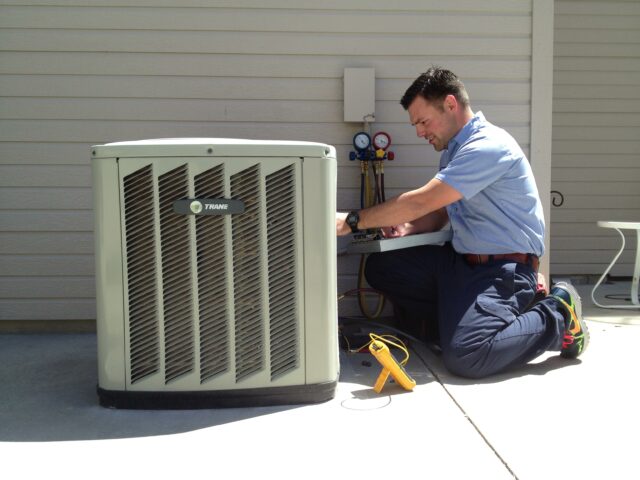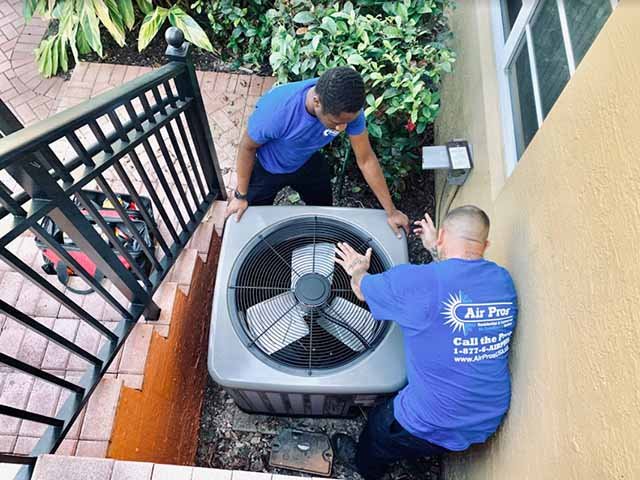As temperatures rise, the last thing you want is for your air conditioning system to fail. A properly functioning AC unit is crucial for maintaining a comfortable indoor environment, especially during the sweltering summer months. However, air conditioners are complex machines, and problems can arise. Whether your AC isn’t cooling effectively or seems to have stopped working altogether, troubleshooting the issue can often be straightforward if you know what to look for.
1. AC Unit Is Not Turning On
One of the most common issues with air conditioning systems is that they simply don’t turn on. If you find yourself in this situation, start with these checks:
- Check the Thermostat: Ensure that the thermostat is set to “cool” mode and the temperature setting is lower than the current room temperature. Sometimes, the issue could be as simple as the thermostat being set too high.
- Inspect the Circuit Breaker: Air conditioners run on electricity, and a tripped circuit breaker can prevent the unit from starting. Check your home’s electrical panel to see if the breaker for the AC unit has tripped. If it has, switch it back on.
- Examine the Power Supply: Ensure the unit is properly plugged in. If it’s plugged into a power strip or an extension cord, try plugging it directly into the wall outlet. Sometimes, the issue could be a loose or disconnected power supply.
- Look at the Disconnect Box: Many air conditioning units have a disconnect box located near the outdoor unit. Ensure that the switch in the disconnect box is turned on.
2. AC Is Not Cooling Efficiently
If your AC is running but not cooling your home effectively, consider these troubleshooting steps:
- Check the Air Filter: A dirty or clogged air filter can restrict airflow and reduce the efficiency of your AC unit. Check the filter and replace it if it’s dirty. Generally, air filters should be replaced every 1-3 months, depending on usage and filter type.
- Inspect the Vents: Ensure that the air vents in your home are open and unobstructed. Furniture, curtains, or other objects can block airflow and reduce cooling efficiency.
- Check for Refrigerant Leaks: Low refrigerant levels can cause your AC to blow warm air. If you suspect a refrigerant leak, it’s best to call a professional technician to handle this issue, as dealing with refrigerant requires special equipment and expertise.
- Examine the Outdoor Unit: Make sure that the outdoor condenser unit is free of debris, such as leaves and dirt, which can obstruct airflow. The unit should be clean and have at least 2 feet of clearance on all sides.
3. The Unit Is Making Unusual Noises
Air conditioners should operate relatively quietly. If you hear unusual noises, it could indicate a problem:
- Hissing or Bubbling: This might indicate a refrigerant leak. As mentioned earlier, refrigerant issues should be handled by a professional.
- Rattling or Clanging: These noises could be due to loose or damaged parts within the unit. Check for loose screws or debris around the fan and condenser unit.
- Grinding: A grinding noise might be a sign that the motor bearings are worn out. This could lead to a complete breakdown of the motor if not addressed promptly.
- Buzzing: A buzzing noise could indicate electrical issues or problems with the capacitor. Electrical issues should always be addressed by a qualified technician.
4. AC Is Cycling On and Off Frequently
If your AC unit seems to be turning on and off more frequently than normal, this could be a sign of several potential problems:
- Check the Thermostat Settings: Make sure the thermostat is not set too low. Setting it too low can cause the unit to cycle on and off rapidly.
- Inspect the Air Filter: A dirty air filter can restrict airflow, causing the system to work harder and cycle on and off frequently. Replace or clean the filter if necessary.
- Examine the Size of the Unit: If your AC unit is too large for your home, it can cool the space too quickly and then shut off, only to restart shortly after. This short cycling can lead to increased wear and tear on the system.
- Check for Refrigerant Issues: Low refrigerant levels can cause the system to cycle on and off. This issue should be addressed by a professional.

5. AC Is Leaking Water
Water leakage around your air conditioning unit can be a sign of several problems:
- Check the Condensate Drain Line: The condensate drain line can become clogged with algae or debris, causing water to back up and leak. Try using a wet/dry vacuum to clear the line or use a pipe cleaner.
- Inspect the Drain Pan: The drain pan collects excess water, and if it’s cracked or damaged, it can cause leaks. Check the pan for any signs of damage and replace it if necessary.
- Look for Frozen Coils: If the evaporator coils freeze, it can cause water to leak as the ice melts. Frozen coils can be caused by a dirty air filter or issues with the refrigerant. Addressing the underlying cause of the freezing is essential.
6. The AC Unit Is Blowing Warm Air
If your air conditioner is blowing warm air instead of cool air, there are a few potential causes to investigate:
- Check the Thermostat Settings: Ensure that the thermostat is set to “cool” mode and not “heat” or “fan” mode.
- Inspect the Air Filter: A clogged air filter can reduce the efficiency of the cooling process. Replace or clean the filter if it’s dirty.
- Examine the Refrigerant Levels: Low refrigerant levels can cause the unit to blow warm air. This issue requires professional attention.
- Check the Ductwork: Leaky or damaged ducts can lead to warm air entering the system. Inspect the ductwork for any visible leaks or damage.
Conclusion
Troubleshooting common air conditioning problems can often be done with a few simple checks and adjustments. Regular maintenance, such as replacing filters and clearing debris, can prevent many issues and keep your system running efficiently. However, some problems, particularly those involving refrigerant or electrical components, require professional expertise. If you encounter persistent issues or are unsure about performing any checks yourself, don’t hesitate to contact a qualified HVAC technician to ensure your system remains in top condition. Staying proactive with maintenance and prompt troubleshooting can help you enjoy a cool and comfortable home all summer long. For additional tips and ideas about air conditioning repair, be sure to visit their page to learn more.

